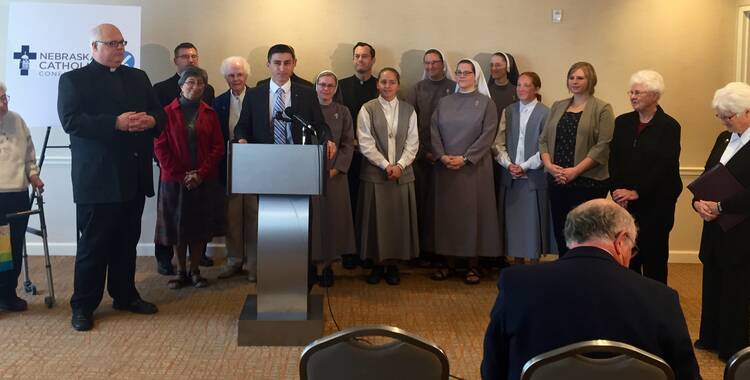Catholic leaders in Nebraska have a message for their flock: There’s no need to bring back the death penalty.
“We want to let Catholics all throughout the state know that the death penalty is not necessary to protect public safety,” Tom Venzor, head of the Nebraska Catholic Conference, said during a press event on Sept. 29, “and for that reason, we urge to vote to retain the repeal of the death penalty.”
RELATED: The 2015 winner of the "Voices from the Margins" short film contest explored the debate over the death penalty in Nebraska.
Stones from America Media on Vimeo.
Nebraska voters face an electoral oddity in November; they are not being asked to repeal the death penalty, but to bring it back.
Last year, Nebraska’s state senators voted to repeal capital punishment. Governor Pete Ricketts then vetoed the measure, but the unicameral legislature was able to override his veto. That led to a successful petition drive by pro-death penalty advocates to have voters settle the debate.
Now, Nebraskans will decide either to retain the repeal or to repeal the repeal.
Anti-death penalty advocates say that kind of language is confusing, so Catholic bishops, priests, sisters and lay people are using homilies, bulletin inserts, radio ads and social media to get the message out that the church is against capital punishment.
RELATED: Bishops Urge Rejection of Death Penalty in California, New Mexico
Catholics make up just over a quarter of Nebraska’s total population, according to the Public Religion Research Institute, but the church’s anti-death penalty campaign is aimed at more than the state’s estimated 375,000 Catholics.
“The church’s message is a message for everybody across the state, for people of all faiths or no faith,” Venzor said. “We believe the message of the church is one that is reasonable and understandable to anybody, and...that’s why we encourage not only Catholics but all people throughout the state to vote to retain the repeal of the death penalty.”
Last summer the state’s three Catholic bishops released a joint statement explaining why they oppose the practice. “Justice requires punishment, but it does not require that those who have committed serious crimes be put to death,” they wrote.
They said the death penalty does not rehabilitate criminals, that the poor and racial minorities are disproportionately sentenced to death and that it does not deter crime. “For the Catholic community, this issue,” they continued, “involves more than public policy. It involves our faith and the central principles that all human life is sacred.”
Anti-death penalty activists commissioned a study that found maintaining the death penalty costs Nebraska taxpayers more than $14 million per year, which they say could be better spent on social programs.
RELATED: From gun control to euthanasia, what Catholics are saying about this fall's ballot measures
Karen Clifton, executive director of the Catholic Mobilizing Network to End the Use of the Death Penalty, told America that upholding Nebraska’s ban and abolishing the death penalty in California could show that capital punishment is on its last legs in the United States.
“Church wise, it would be a pro-life win, which we need,” she said. “It also sends a really strong message, especially when we have assisted suicide laws coming up for debate, that if the guilty have a right to live, then everyone does.”
Nebraska won’t be alone when it comes to death penalty questions this November.
Voters in California must decide two questions, whether to repeal the death penalty as well as adopting a new process to speed up execution dates. Catholic leaders there have weighed-in, urging the faithful to vote to end the death penalty.
“It is time for us to end the death penalty–not only in California but throughout the United States and throughout the world," Los Angeles Archbishop José H. Gómez wrote in a column for the archdiocese’s website.
And in Oklahoma, voters must decide whether or not to enshrine the death penalty in that state’s constitution. The practice is already legal there, but it is on hold following botched executions in 2015.
Catholic teaching states that the death penalty is permissible only in situations in which there is no other way to protect people from a violent criminal. But the last three popes—John Paul II, Benedict XVI and Francis—have each suggested that this is no longer the case anywhere in the world and they have called for an end to capital punishment.
The number of executions carried out in the United States has been on a downward trajectory since 1999, when 98 people were killed. So far this year, 15 people have been executed.
Acquiring the needed drugs to carry out executions has become more difficult for states, and public support is declining overall. Just 49 percent of Americans support the death penalty, according to the Pew Research Center, down from a high of 80 percent in 1994.
That poll found that U.S.Catholics are also split on their support for the death penalty, which is still on the books in 30 states. Fewer than half (43 percent) of all U.S. Catholics support the death penalty, though that number increases to 54 percent among white Catholics.
Speaking for the Sisters of Mercy during Thursday’s press conference in Nebraska, Sister Jeanne O’Rourke said capital punishment isn’t merciful, cited Pope Francis’ Year of Mercy and called on Catholics to vote accordingly.
“The death penalty isn’t merciful because when the state kills in our name, we have blood on our hands,” she said.
Catholic leaders in Nebraska trying to convince their fellow citizens to back the church’s view on the death penalty face an uphill fight: A poll conducted earlier this summer for a pro-death penalty group found that a large majority of voters (58 percent) say they plan to repeal the repeal and bring capital punishment back to Nebraska.
Michael O’Loughlinis the national correspondent for America. Follow him on Twitter at @mikeoloughlin.







